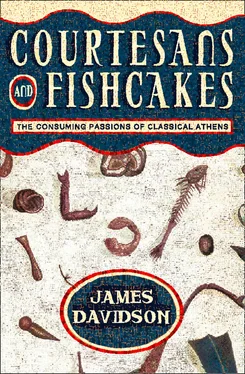But this is to ignore certain characteristics of this commercial drinking which shine through, even though the evidence is so scattered. First of all, the bars are so often ‘local’. They nestle snugly into the neighbourhood. The nurse only has to pop across the road to her kapēleion , as do so many others from cuckolded Euphiletus to Blepyrus in the Wealth , and there she finds someone to buy her a drink. Blepyrus in that play thinks he recognizes in the goddess Poverty the cheating barmaid from his local and there is certainly an expectation that customers and clients would know each other and their drinking habits. This is a long way from anonymous drinking: ‘There is a taverner in our neighbourhood; and whenever I feel like a drink and go there, he knows at once – and he only knows – how I have it mixed. I always know that I’ll be drinking it neither too watery, nor too strong.’ The bonds betwen barmen and their regulars are reflected in the practice of drinking on tick. Athens was a city in which borrowing was very common. Ready use of credit is often seen as an indication of a highly developed capitalist economy, but in many societies, and in particular at Athens, it seems to have more in common with pre-money economies based on gift-exchange, a transaction which shifts the burden of trust away from the quality of the coinage and back to personal acquaintance. The practice of ‘ prodo-sin pinein ’ fatally compromises the impersonality of drinking in a tavern, tying up the free-flowing promiscuous exchange of commodities with bonds of debt and trust. It is a sign of the depths to which insolvency has brought Aeschines the Socratic, that even the local kapēloi have stopped advancing him credit. 35 Конец ознакомительного фрагмента. Текст предоставлен ООО «ЛитРес». Прочитайте эту книгу целиком, купив полную легальную версию на ЛитРес. Безопасно оплатить книгу можно банковской картой Visa, MasterCard, Maestro, со счета мобильного телефона, с платежного терминала, в салоне МТС или Связной, через PayPal, WebMoney, Яндекс.Деньги, QIWI Кошелек, бонусными картами или другим удобным Вам способом.
The distinction between symposium and kapēleion , then, was one of class and culture rather than of socialization. The tavern was differently socialized rather than unsocialized and if it was the site of those excesses whose debris so impressed the archaeologists, its reputation at Athens was not worse than that of the symposium. In fact, in the popular imagination it figures, if anything, as less of a threat to public order than the aristocratic drinking-party. For this, of course, was a democratic city with a radical reputation. Non-Athenians like Theopompus and Diogenes or the government of Thasos looked on taverns very differently.
To a surprising degree the Greeks anticipate modern debates about drinking as a drug or as a social catalyst. They were nervous drinkers and shared the anthropologists’ anxiety about the threat wine presented to socialization, agreeing with Brillat-Savarin that the discipline of conversation must restrain it. One important aspect of the Greek problematic of wine finds few modern parallels, however, focusing neither on the community of drinkers nor on the drink, but on something in between.
Some of the most surprising texts on the subject of drinking in antiquity are those fragments in poetry and prose in praise of Spartan drinking habits composed by the Spartan-loving revolutionary oligarch, Critias of Athens. In his Elegies he contrasted Spartan drinking habits – each man from his own cup, no toasts passed around and, he insists, no drunken excess – with Athenian practice. In a similar work, The Constitution of the Spartans , he elaborated his praise of Spartan institutions in prose with an encomiastic examination of the smallest details of their daily life from their footware to their crockery: ‘Laconian shoes are the best; their cloaks are the most pleasant to wear as well as being the most useful; the Spartan kōthōn is a cup most appropriate for military service and easily transportable in a kit-bag. It is a cup for soldiers, because it is often necessary for them to drink water that is not clean: the liquid inside a kōthōn cannot be seen too clearly, and the cup has ridges so that it retains any impurities.’
This fragment of Critias is the first in a strange series of rationalizations penned by the supporters of Sparta’s peculiar conventions. Xenophon, for instance, tells us that Lycurgus devised red cloaks for the Spartiates because he believed this costume had least of all in common with a woman’s dress. He also permitted men past their first youth to wear their hair long, not for the sake of vanity, but because he thought it would make them look taller, more gentlemanly, more terrifying. Aristotle in his Constitution of the Spartans returned to the same theme. Red cloaks were inherently masculine. Their sanguinary dye accustomed the Spartans to depise the flow of blood. Plutarch had a slightly different explanation: the crimson colour was designed to disguise from the enemy the fact that they had been wounded. In the Rhetoric , again, Aristotle gives a Veblenian elaboration of Xenophon’s views on long hair: ‘it is the mark of a gentleman, for it is not easy to perform a plebeian task with long hair.’ 37 Конец ознакомительного фрагмента. Текст предоставлен ООО «ЛитРес». Прочитайте эту книгу целиком, купив полную легальную версию на ЛитРес. Безопасно оплатить книгу можно банковской картой Visa, MasterCard, Maestro, со счета мобильного телефона, с платежного терминала, в салоне МТС или Связной, через PayPal, WebMoney, Яндекс.Деньги, QIWI Кошелек, бонусными картами или другим удобным Вам способом.
It is not difficult to see that this exegesis of the semiotics of Spartan fashion is rather defensive in tone, the self-conscious forging of a myth. The writers protest too much, and the reason for their defensiveness is not hard to find: the habits they describe look rather like luxurious practices to the Athenian eye. This is most obvious with the custom of wearing the hair long, a vogue that, outside the boundaries of Laconia, aroused considerable suspicions, drawing charges of effeminacy and enervation and bringing to mind paragons of long-haired vice like the fictional profligate Pheidippides in Aristophanes’ Clouds or, on the very streets of Athens, infamous Alcibiades. Similar connotations of luxury hover around other items of Spartan fashion. Laconian shoes are fine pieces of footwear, the shoes of gentlemen in contrast to the felt slippers of the poor. The phoinikis too, the scarlet cloak with its expensive vermilion dye, evokes extravagance to an outsider’s eye. 38 Конец ознакомительного фрагмента. Текст предоставлен ООО «ЛитРес». Прочитайте эту книгу целиком, купив полную легальную версию на ЛитРес. Безопасно оплатить книгу можно банковской картой Visa, MasterCard, Maestro, со счета мобильного телефона, с платежного терминала, в салоне МТС или Связной, через PayPal, WebMoney, Яндекс.Деньги, QIWI Кошелек, бонусными картами или другим удобным Вам способом.
In democratic Athens the whole get-up would look like something very far from asceticism. The attachment of the Spartan epithet to the paraphernalia of a rich and opulent lifestyle was a continual rebuttal of those citizens of oligarchic tendency who tried to emulate the Spartan way of life, holding it up as an example of moderation and restraint.
Читать дальше












